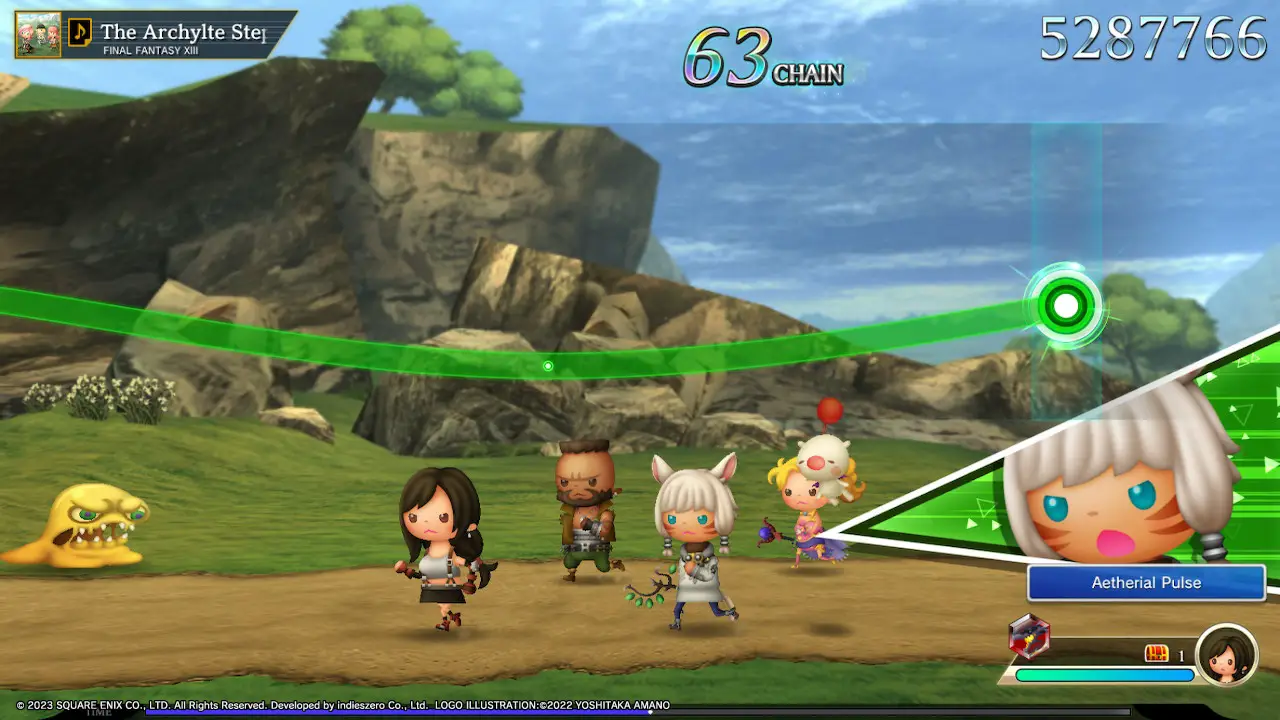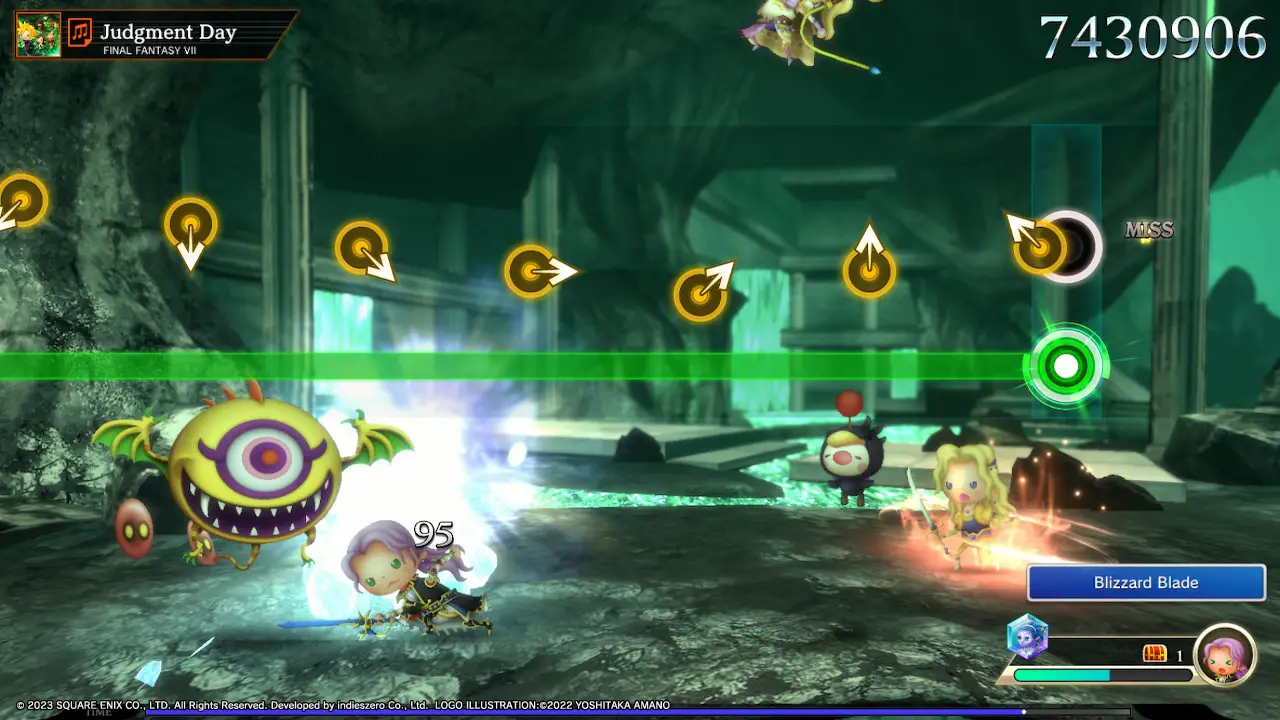Correction: Stranger of Paradise is represented in the game. However, there are still notable titles missing so the point still stands.
Final Fantasy has some of the best music in video games, so it’s no surprise that the franchise would eventually delve into the rhythm game scene. Of course, just like the main series, Theatrhythm adds some superfluous complexity on top of the usual pressing buttons to the music gameplay. After starting out on the 3DS, the series has made its way to Switch for the full HD treatment. With just about every game in Final Fantasy represented, is Theatrhythm Final Bar Line worthy of the name?
Final Bar Line has three main modes: Series Quests, Music Stages, and Multi Battle. Music Stages allows you to select any song and play through it, while Multi Battle is a four player online versus. mode. Series Quests is essentially the campaign, in which you unlock and play through titles to earn new characters, songs, and cosmetics. Starting off, you can only pick from a few of the 29 titles represented, such as Final Fantasy VII or XIV, but as you complete those you’ll be able to unlock more. Each title has around 14 or so songs in it, with XIV being an outlier at 32 songs, taking you through a musical journey from humble beginnings to killing god. It’s a neat way to give every game a spotlight and respect their histories.
This game really is all about the history of the series, with the original tracks from every game being used in lieu of orchestral versions. So you’ll be listening to the NES’s sound chip in FF’s 1 through 3. While I didn’t appreciate Melody of Memory using the old Midi versions in that game, it feels more appropriate here showing how far the franchise has come in 35 years. It is odd that we’re missing more recent titles like Stranger of Paradise and Endwalker, but there’s still a massive selection of tunes here.
Depending on the type of tune you choose, you’ll play one of three types of stages. Battle Music Stages, or BMS, represent the battle music and have your chosen party of characters fight iconic foes. How well they do depends mostly on how well you hit the triggers to the music. It usually doesn’t matter what button you press thankfully, so you can move to the music however you like. Red triggers represent a single button press, Green indicates holding the button down, and yellow needs you to move one or both of the sticks in the given direction. In BMS, there are four lanes triggers will approach from, but these are mostly for decoration outside of hitting two buttons at once. Missing a trigger entirely will cause your party to take damage. If your HP hits zero it’s game over, while timing it perfectly will result in a rainbow critical, dealing more damage.

Meanwhile, FMS or Field Music Stages have your party walking along and occasionally battling creatures to the tune of town or area music. It’s very similar to BMS, but instead of four lanes you may need to move the one up and down during green triggers to match the line. Finally, Event Music Stages (guess the abbreviation) are exactly the same as BMS, but with triggers approaching vertically and a video from whatever game the stage is based on playing in the background. The focus of each stage type is squarely on the music, but if you want to complete every quest to fill out the museum you will need to dive into the RPG mechanics.
Your party is made up of four characters, a summon, as well as an airship and Moogle costume for cosmetics. Opening up a title for the first time will grant you a few characters from that game, such as Lightning or Bartz. Each character comes with a role, like attacker, mage, defender, healer, or support, and four equipable moves acquired as they level up. You can compose (pun intended) your party however you like, and may need to make weird combos to complete quests in Series mode by, for example, defeating the boss of a stage with ice magic. I mostly just stuck with favorites, swapping characters out as they hit max level (you can increase stats beyond that by gaining XP). It’s a neat system that you can engage with as much or as little as you want while not feeling superfluous. It’s also just nice fan service to be able to make a party of Fran, Barret, Terra, and Alphinaud.

A game like this lives or dies on its song selection, however, and it’s mostly great. You’ve got several iconic tunes from each game like Battle on the Big Bridge, Blinded by the Light, and Aerith’s Theme. There are some weird choices though, like the Crystal Chronicles Series section consisting of 90% songs from the first game. That’s not a bad thing, Crystal Chronicles has one of if not the best soundtrack of all time, but the single song not from that game is one of the worst tracks from Crystal Bearers. Meanwhile, Final Fantasy XIII-2 (the main series’ objectively greatest OST) is filled with bangers, but is missing one of my favorites, Worlds Collide, and has the weird and bad metal Chocobo theme for some reason. These are just two examples, but you will find odd song choices in quite a few titles. It does stand out when all the other song selections are great.
While the song list in Theatrhythm is huge, there is a season pass and deluxe edition to add music from non-Final Fantasy titles like SaGa, Xenogears, and NieR. I’m not opposed to more content, especially from musical juggernauts like those series, but taking all together I can’t just ignore how much this would cost. The base game is $50, but to get everything you’ll be paying twice that, which is a lot for a rhythm game. On top of that, a few iconic songs are locked behind the deluxe and premium editions including FFVIII’s Eyes on Me, Sound of the Wind from Crystal Chronicles, and X’s Zanarkand (arguably the main theme from each of those games). I can live with remixes, acoustic versions, songs from the Black Mages, and those kinds of things being locked behind a more expensive version but something like Eyes on Me is key to FFVIII’s identity. It’s less like adding additional content, and more like holding some back. As such, it kinda taints the rest of the game with a feelling of greediness. I don’t normally talk about prices as I believe every game should be judged on its own artistic merits, but it’s inextricably linked here. Even though we were provided all content including the season passes, if that weren’t the case I would feel like I was missing key songs. It’s a mark on what is otherwise a good celebration of the franchise.




















